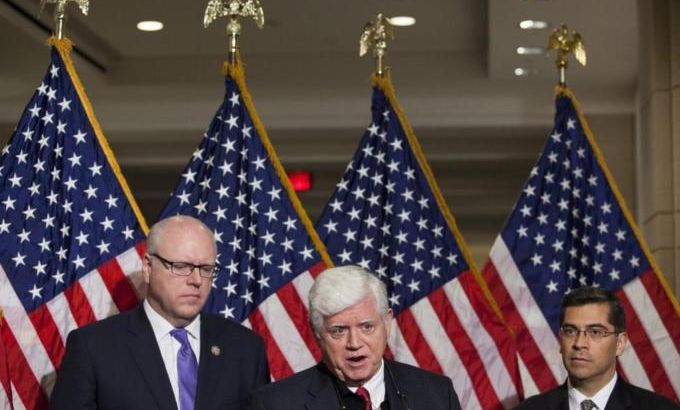Last push to avoid US ‘fiscal cliff’
Drastic tax increases and spending cuts likely to kick in on January 1, as Congress strains to strike last-minute deal.

US lawmakers have dragged the country to the edge of the “fiscal cliff” as they struggled to reach a last-minute deal that could protect the world’s largest economy from a politically-induced recession.
Democratic and Republican leaders in the Senate had hoped on Sunday to clear the way for swift action that would avert sweeping tax increases and spending cuts due to kick in on Tuesday.
Keep reading
list of 4 itemsUS imposes new sanctions on Iran after attack on Israel
A flash flood and a quiet sale highlight India’s Sikkim’s hydro problems
Why is Germany maintaining economic ties with China?
But with the two sides still at loggerheads in talks, Senate Democratic leader Harry Reid postponed any possible votes and the Senate adjourned until Monday, leaving mere hours to pass any deal that may emerge through both chambers of a bitterly divided Congress.
“There are still significant differences between the two sides,” Reid said on the Senate floor.
Behind closed doors, the parties kept seeking a way to bridge deep divides over taxes and spending.
But even if a deal emerges in the coming hours, under Senate rules any one of the 100 senators could prevent the chamber from acting quickly.
Prospects are also uncertain in the House of Representatives, where dozens of conservative Republicans could oppose any deal that includes a tax increase on the nation’s wealthiest households.
As the hours ticked away, it appeared increasingly likely that Washington’s failure to act would deliver a $600bn hammer blow to the fragile US economic recovery.
“Something has gone terribly wrong when the biggest threat to the American economy is the American Congress,” said Democratic Senator Joe Manchin of West Virginia.
Americans could see a bigger bite taken out of their paychecks starting on Tuesday as payroll and income tax cuts expire, while 2 million unemployed Americans could see their jobless benefits run out.
Government contractors might be forced to lay off employees as $109bn in automatic spending cuts kick in, and businesses could lose tax breaks for everything from wind power to research and development.
New Year’s uncertainty
The uncertainty has weighed on financial markets and forced businesses to slow hiring and investment. Market participants braced for more turbulence on Monday.
“I believe investors will show their displeasure tomorrow by selling stocks if there is no deal,” said Mohannad Aama, managing director at Beam Capital Management in New York.
Al Jazeera’s John Terrett, reporting from Washington, said, “The ‘fiscal cliff’ is just a fancy way of saying ‘budget crisis’.
“Now it’s all coming to a head, but it doesn’t necessarily all happen on Tursday, so there’s certainly time for the politicians to sort out the big issues,” our correspondent said.
|
|
| What is the “fiscal cliff”? |
“Wall Street doesn’t come back until Wednesday. But if you let the country go over fiscal cliff, you would go a long way to sorting out deficit and debt crisis.”
Though corporate chieftains have lobbied lawmakers to show flexibility, Congress also faces pressure from an array of interest groups urging them not to compromise core principles.
Conservative groups have warned Republicans that a vote to increase any taxes could be held against them, while liberal and labour groups have pressed Democrats to resist any benefit cuts to popular retirement and health programmes.
Lawmakers may find it easier to act once the country goes over the “fiscal cliff” on January 1, as any new legislation can then be portrayed as a tax cut rather than a tax increase.
Republicans floated a proposal on Sunday to slow the growth of Social Security retirement benefits by changing the way they are measured against inflation, but they backed away after Democrats said they would not consider it.
Buoyed by his re-election in November, Obama has insisted that any deal must include a tax increase on the wealthiest Americans, who have seen their earnings rise steadily over the past decade at a time when income for the less affluent has stalled.
Obama has proposed raising income taxes on households that earn more than $250,000, but Republicans pushed to set the threshold between $400,000 and $500,000. Republicans also were resisting a Democratic proposal to raise inheritance taxes on the wealthiest estates.
Republicans were looking for new reductions to replace the looming spending cuts, which would fall equally on military and domestic social programmes. Democrats say the increased taxes on the wealthy would generate enough revenue to offset those cuts.